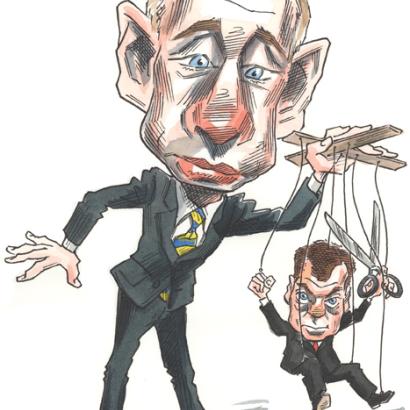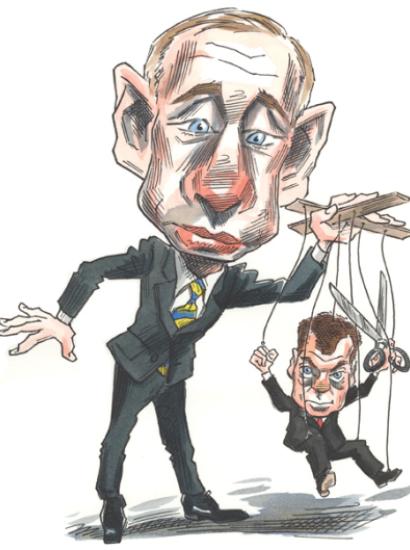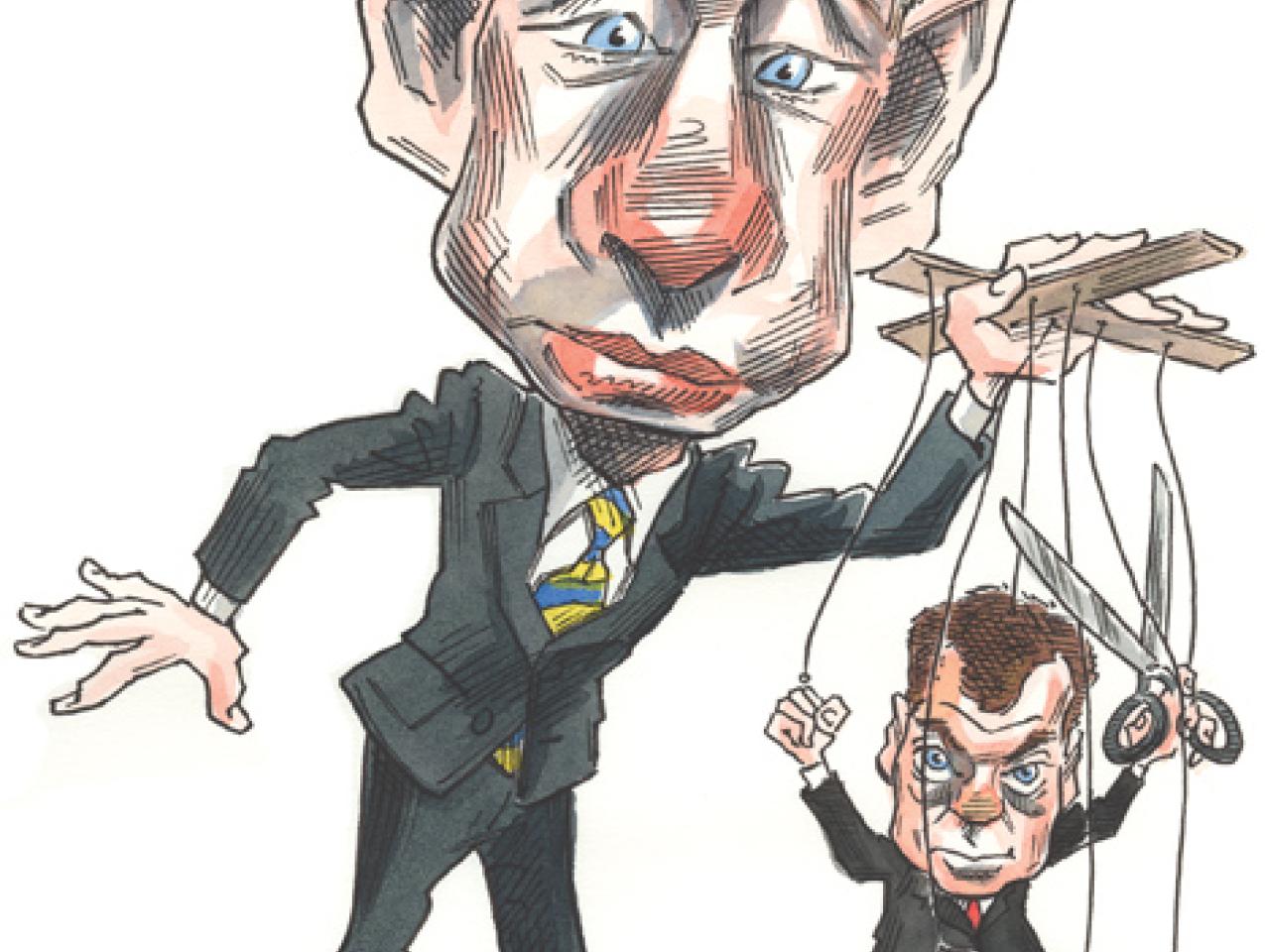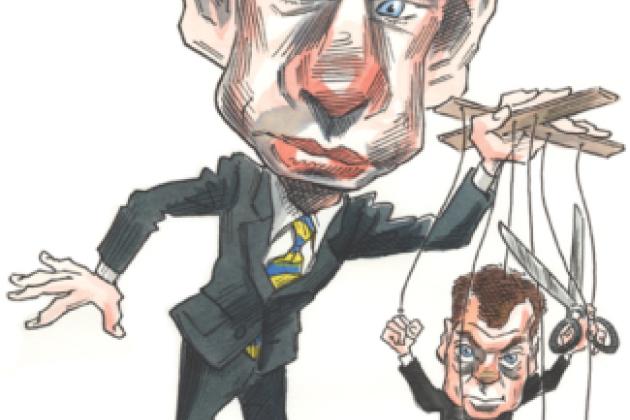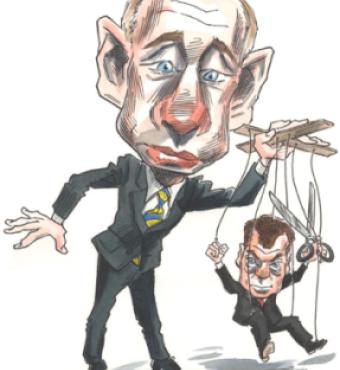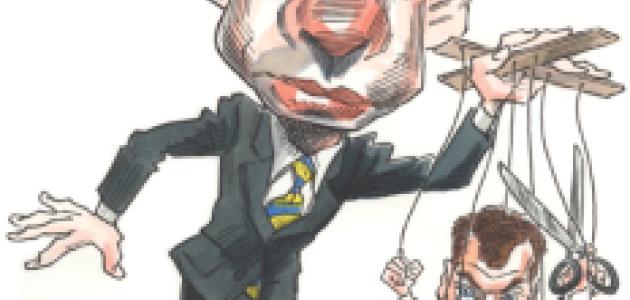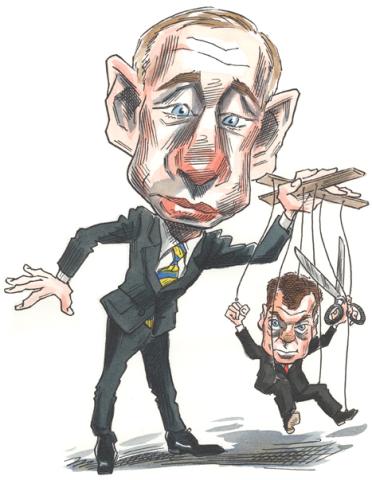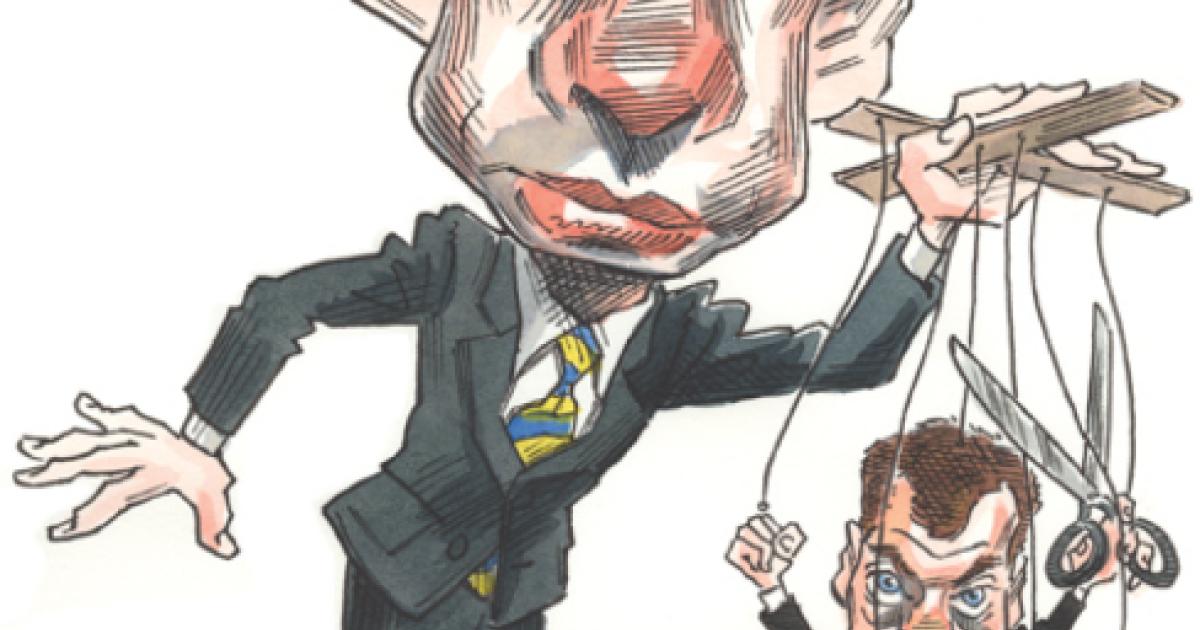- Economics
- Energy & Environment
- US
- Contemporary
- Economic
- World
- International Affairs
- US Foreign Policy
- History
To understand the upper circles of power in Russia requires assembling a complex jigsaw puzzle of public statements, rumors, and actions. Having only a few pieces of the puzzle won’t do. And even if all the pieces are present, they remain almost impossible to fit together without some sort of guide. In Russia, perhaps more than elsewhere, the past may be this guide.
The facts, as we know them, are that there has been a formal transfer of constitutional power from Vladimir Putin to Dmitry Medvedev, an ostensible power-sharing arrangement whose true nature has yet to be revealed; Russia has become prosperous, largely because of petrodollars; the “commanding heights” of the economy have been renationalized; and democracy and press freedom have withered.
Also striking is the remarkable power shift from the private oligarchs of the immediate post-Soviet era to today’s “KGB state,” a powerful creation with a culture unconstrained by law. The major players cut their political teeth in the Soviet period; many belonged to the same political organizations. Brought to power by Putin, a former secret policeman, former KGB officers command Russian industry and commerce; there are more officers of the FSB (the successor agency to the KGB) per capita than in Soviet times; the FSB electronically monitors the population, controls political groups, particularly youth organizations, carries out covert operations abroad, creates its own enterprises, and operates its own prisons. Former KGB officers have accumulated incredible amounts of personal wealth. Putin has paraphrased Josef Stalin’s aphorism that “KGB officers either advance or go to prison” into “There is no such thing as ex-KGB.”
But is there? What if Putin or Medvedev (or both) were to try to rein in the KGB state? On a related note, do Putin and Medvedev intend to share power for more than a transitory period? If so, would this work? Russian history has a lot to say about these missing puzzle pieces. Past leaders saw extreme dangers in a state dominated by the secret police and made sure to keep them in check. Moreover, it seems that in Russia power cannot be shared at the top and that the victor in power struggles is often the one who is the least expected.
BEWARE THE FACELESS BUREAUCRAT
Russia is now presumably ruled by the power-sharing “dvoika” of Medvedev, the duly elected president of the Russian Federation, and Putin, his mentor, predecessor, and now his appointee as prime minister. Putin also serves as the chair of United Russia, the party that holds the overwhelming number of seats in the State Duma. Before he was appointed first deputy prime minister in 2005, Medvedev was Putin’s chief of staff and “friend of the president.” The presidency is his first elective office.
Putin was facing a constitutional term limit when he entered into this power-sharing arrangement with Medvedev, his largely unknown but loyal colleague from the back office. Given Putin’s proclivities toward control and an incomplete agenda of restoring Russian greatness, some interpret this arrangement as a back door by which Putin can remain in charge. Under this interpretation, his friend Medvedev serves as a figurehead and Putin decides, in Vladimir Lenin’s words, “what is to be done.” An alternative hypothesis is that Putin aims to ease the transition to a new regime, after which he can withdraw from public service. If Putin’s goal is to hold on to power, is there room at the top for two Russian leaders?
It seems unlikely. Power-sharing agreements, in any setting, are fragile plants that rarely survive the light of day. Russia has many such examples. The last czar reneged on his agreement to share power with an elected State Duma. In the early Soviet era, party bosses Lev Kamenev and Grigory Zinoviev brought the faceless party bureaucrat Stalin into a power-sharing troika after Lenin’s death—only to see him usurp all decision-making authority. When they protested Stalin’s violation of their agreement, he responded that “loyalty is a malady that afflicts dogs.” Stalin’s next alliance was with his “good friend” Nikolai Bukharin, whose betrayal he laconically shrugged off shortly before Bukharin’s arrest: “Friendship is friendship; duty is duty.” As Stalin lay dying in 1953, secret police chief Lavrenty Beria and Stalin ally Georgy Malenkov agreed to share power, but this arrangement ended almost as soon as it began, when Beria was arrested. In 1964, there was a brief troika of Leonid Brezhnev, Aleksei Kosygin, and Anastas Mikoian after Nikita Khrushchev’s ouster, but the power of the latter two faded as party general secretary Brezhnev took the reins.
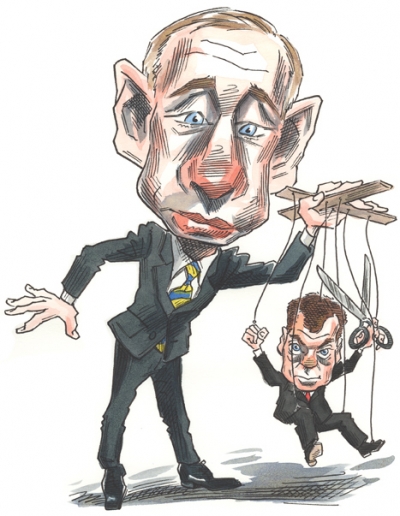
Putin emerged under similar murky circumstances. Another faceless bureaucrat, he came to power under an agreement with Boris Yeltsin’s family and its oligarch backers that he would ensure immunity for Yeltsin (which he did) and allow the oligarchs to keep their wealth (which he did not). We do not know enough about Medvedev to determine why Putin selected him from the crowd of potential successors—a rise as obscure as Putin’s own.
Russia’s faceless bureaucrats often become powerful leaders. Like Medvedev, past leaders were initially underestimated. Kamenev and Zinoviev chose Stalin because he handled the party paperwork and they thought they could control him by invoking, if necessary, Lenin’s written advice to “find a way to get rid of comrade Stalin.” The Yeltsin family and associated oligarchs presumably chose Putin because his KGB connections would enable him to meet the terms of their agreement.
Putin, if he wishes to remain in charge, must have in place protections to ensure that Medvedev will not treat him the way Stalin treated Kamenev and Zinoviev or Putin himself treated Yeltsin’s oligarchs. Putin surely would not trust even a long-standing relationship with his junior colleague. When Bukharin argued before the party in 1936 that someone with his party credentials and service could not betray the party, soon-to-be NKVD head Beria responded, “But it is difficult to look within the soul.” Similarly, Putin cannot look within Medvedev’s soul to determine whether this polite and reserved younger man could betray him. If Putin has taken a leaf from Stalin’s playbook, he will have tucked away compromising material on Medvedev.
THE CONSTITUTION IS ON MEDVEDEV’S SIDE
But now we turn to the law, which examines Medvedev’s role from a different angle. A cursory examination of the 1993 Russian constitution yields the clear conclusion that the top position is the presidency and that the prime minister serves at the discretion of the president. Yeltsin himself flaunted this fact by running through six prime ministers during his term. (Putin limited himself to four.) According to the constitution, the president defines “basic foreign and domestic policy,” has the right to preside over meetings of government, is the “supreme commander in chief,” has the authority to rule by decree, and appoints (subject to the approval of the legislature) the prime minister, the chair of the Central Bank, deputy prime ministers, judges of the constitutional court and supreme court, and so on. The president can overturn regional legislation if it violates federal law or the constitution.
Putin’s constitutional role as Medvedev’s prime minister is to execute general policies defined by the president (“the president shall define the domestic and foreign policy guidelines of the state”). This is a convenient arrangement for the president because it allows the president, whose fouryear term can be broken only by impeachment or incapacity, to alter course by changing government. In time-honored Russian tradition, policy failures can be blamed on the executor of the policy (the prime minister) and not the policy itself.
The Russian constitution gives relatively little power to the legislature, or State Duma. Its main powers are to approve presidential appointments and to pass or reject legislation proposed by the president. (It also has the power to initiate legislation.) The president’s strongest card in any conflict with the legislature is to dissolve the Duma if it rejects the president’s nominee for prime minister. The president decides whether to accept or reject a prime minister’s resignation, and the president can fire him. If the Duma expresses no confidence in the government twice within three months, the president must either announce the resignation of the government or dissolve the Duma. If legislators fear facing the voters, they will be hesitant to buck the president’s powers of appointment.
There appear to be no provisions in the constitution that allow the Duma to protect a “popular” prime minister—say Putin—from dismissal by the president. If Medvedev wished to fire Putin and even if the Putincontrolled Duma opposed him by an overwhelming vote, Medvedev apparently would have the power to dissolve the Duma and call new elections. Presumably, such a confrontation would be costly to all concerned.
It is difficult to picture Putin taking responsibility for the policy failures that are sure to come, yet this is the constitutional role in which he has placed himself. He has willingly shifted responsibility to a new president.
CONTROL THE APPARAT, CONTROL THE COUNTRY
Ever since the Russian Federation was founded, the bureaucracy has grown faster than any other employment category. Russia is as bureaucratic now as it was in the Soviet period, if not more so. This bureaucracy is divided into a number of “apparats” of various organizations and agencies. (An apparat is the back office populated by unelected officials, little known to the public and press but well known to one another.) The power of an apparat lies in its ability to order “telephone justice” (to tell judges what their verdicts will be), to gather compromising material, to dictate to television broadcasters who their guests can be and what topics can be covered, to rough up demonstrators, and perhaps to order character assassinations, poisonings, and contract killings.
This too evokes the Soviet era. When the relatively obscure Stalin was appointed general secretary of the Central Committee, he refused to behave like a paper pusher. He used his bureaucratic clout to call meetings of the Politburo and organize its agendas, and he used his Orgburo to vet major appointments. By the mid-1920s, most regional party leaders were his appointees, and he had infiltrated the agencies of his rivals with his own loyalists. By 1927, he was equating his Central Committee with the party itself, taunting his rival Lev Kamenev: “In the name of what organization do you speak?” Any disagreement with Stalin, who now fully controlled the machinery of the state, became a disagreement with the party.
Today’s Russia has several power centers. The dominant apparat has been that of the Presidential Administration within the Kremlin walls; the apparat of the Government of the Russian Federation, located in the White House, has been less powerful. The apparat of the Duma pales in comparison with either. Even under a weakened Yeltsin, his presidential apparat had the power to re-elect him, despite a presidential popularity rating of less than 5 percent. The KGB state throws a wild card into the battle of the apparats. Its ostensible apparat is the thousands of employees on the FSB payroll, but beneath the surface is an unofficial network of former KGB officers, united by a common “corporate culture,” who run Russia’s large corporations, newspapers, television stations, courts, prosecutors’ offices, arms industry, and defense.
Putin, if he sought to remain in charge, would try to maintain control of the bureaucracy. Under this scenario, Medvedev would have the formal power but Putin would have the appointments, influence, and networks. The constitution calls on the prime minister to “submit to the president proposals on the structures of the federal bodies of executive power”; Putin, as the new prime minister, has transferred the power brokers of his former presidential administration to the prime minister’s office. One of Putin’s deputy prime ministers—in charge of security matters—was head of state security during his presidency. Such moves suggest that Putin is seeking to concentrate power in his own apparat, not Medvedev’s.
But a key point is that Putin appears to have accepted the proposition that he must remain within the constitution. Buoyed by high public opinion ratings and his control of the media, he could easily have won a third presidential term, but—contrary to the expectations of many—he obeyed the constitutional two-term limit. We should not overlook the significance of this. Note, too, that Putin’s major actions as president were also formally consistent with the constitution. For example, when he decided in 2004 to appoint regional governors instead of allowing them to be elected, his actions were criticized as undemocratic, but he was exercising the president’s constitutional power “to appoint and dismiss plenipotentiary representatives of the president” and relying on a constitution that did not require such elections.
If his goal is to remain in charge, how can such a calculating and wily politician as Putin enter into a power-sharing arrangement in which the constitutional deck is stacked against him? There are two possible answers. He may be sharing power to ease the transition of his pupil to power, or he may have succumbed to his own press clippings—believing that he can remain in charge informally by relying on his connections and his influence over a beefed-up prime minister’s apparat. Putin may be overconfident. Like others before him, he could discover that his power derives not from his person but from his office. Those who owe him their loyalty may conclude, as Stalin did, that “loyalty is a malady that afflicts dogs.”
CURBING TH E KGB STATE
What does Putin intend to do with the KGB state he helped bring about? As someone who presumably wishes to restore Russia to greatness and has a grasp on practical politics, he must understand the danger that this state within a state poses not only to Russia but eventually to him.
Long ago, Lenin and Stalin agreed on the need for a ruthless political police force and vested it with extreme power. Yet Stalin understood all along that an organization this powerful could overpower him and his regime. Khrushchev, in his memoirs, summarized Stalin’s growing fear of his own secret police: “Stalin and Beria had developed very refined methods for killing people; they thought up incredible ways of doing it. Now he was projecting all this back on himself, thinking: ‘Why couldn’t the people who want to see me wiped off the face of the earth use similar methods against me?’ I think that these kinds of thoughts began to torment him.”
His successors also understood. Khrushchev warned his comrades that after Stalin’s death Beria would use his power “to spy on members of the Politburo, to eavesdrop, to fabricate cases, to engage in intrigue. It will be the end of us all.” An otherwise timid Politburo steeled itself and executed Beria in December 1953.
Only an insider can tame the KGB state. Putin, a member of the club, has so far kept it in check, even though the current KGB state, unlike the tightly organized bureau of the Stalin era, appears to be a decentralized, loose-knit fraternity of “clans” linked to “private security services,” “bodyguard agencies,” arms merchants, and KGB-led corporations that seem to report to no one in particular. It is wealthy and powerful—a potential rogue state within a state.
Thus it is significant that Putin selected as his successor not a KGB insider but a lawyer, whose first statement as president included coded language— the need for the rule of law—that points to a confrontation. A KGB state cannot coexist with a country that operates under the rule of law. This battle was fought in Stalin’s time, when lawyers and prosecutors pressing for an admittedly weak rule of law, dubbed “socialist legality,” clashed with the security agencies and their “extraordinary measures.” Medvedev’s call for the rule of law issues a fresh challenge to the KGB state.
Stalin used extrajudicial tribunals during what he regarded as extraordinary times; during ordinary times he turned back to the prosecutors and courts. If Putin intends to back Medvedev on the rule of law, he may be following Stalin’s instincts to rein in the police state. If so, Russia may have achieved some degree of equilibrium, and may be able to anticipate a more normal life.








